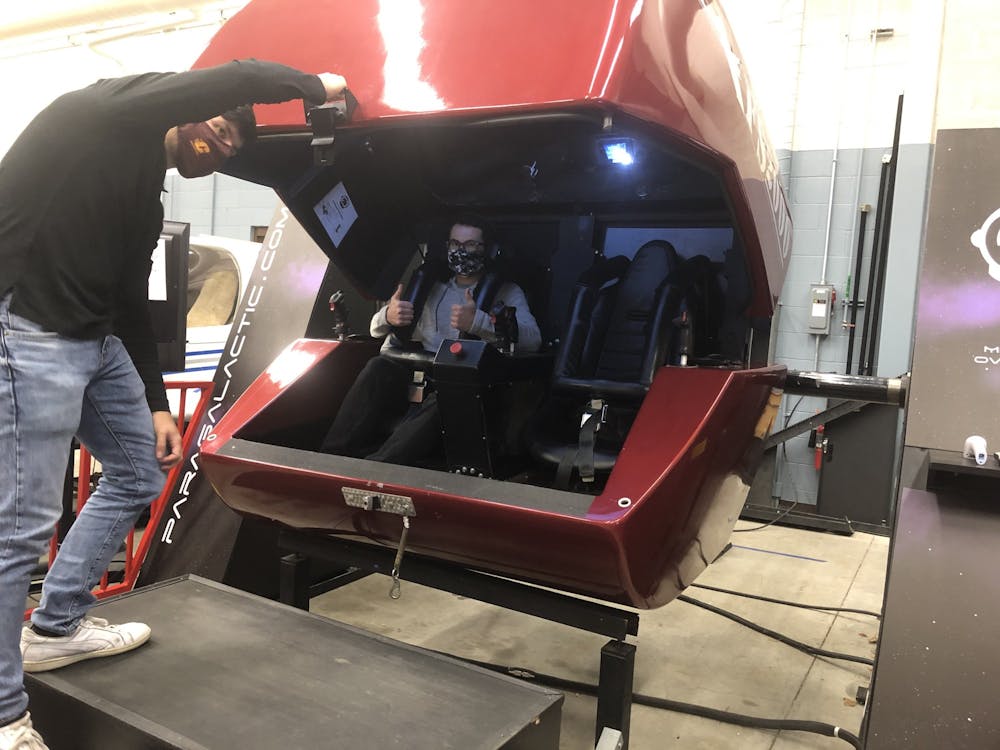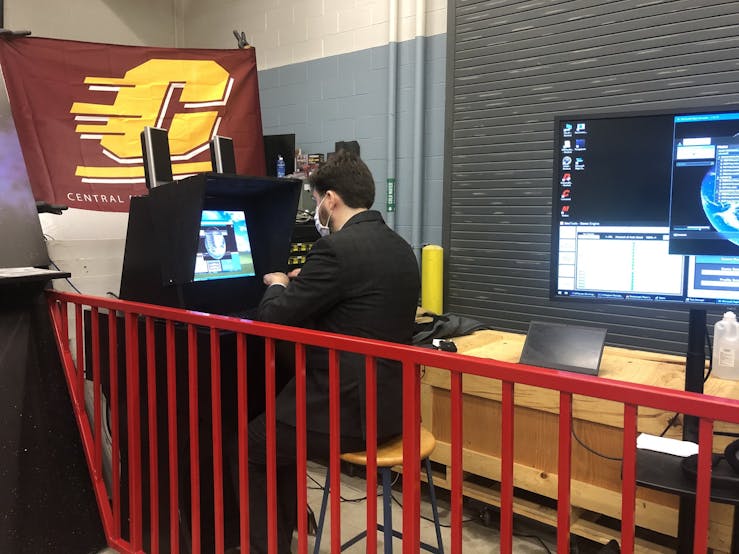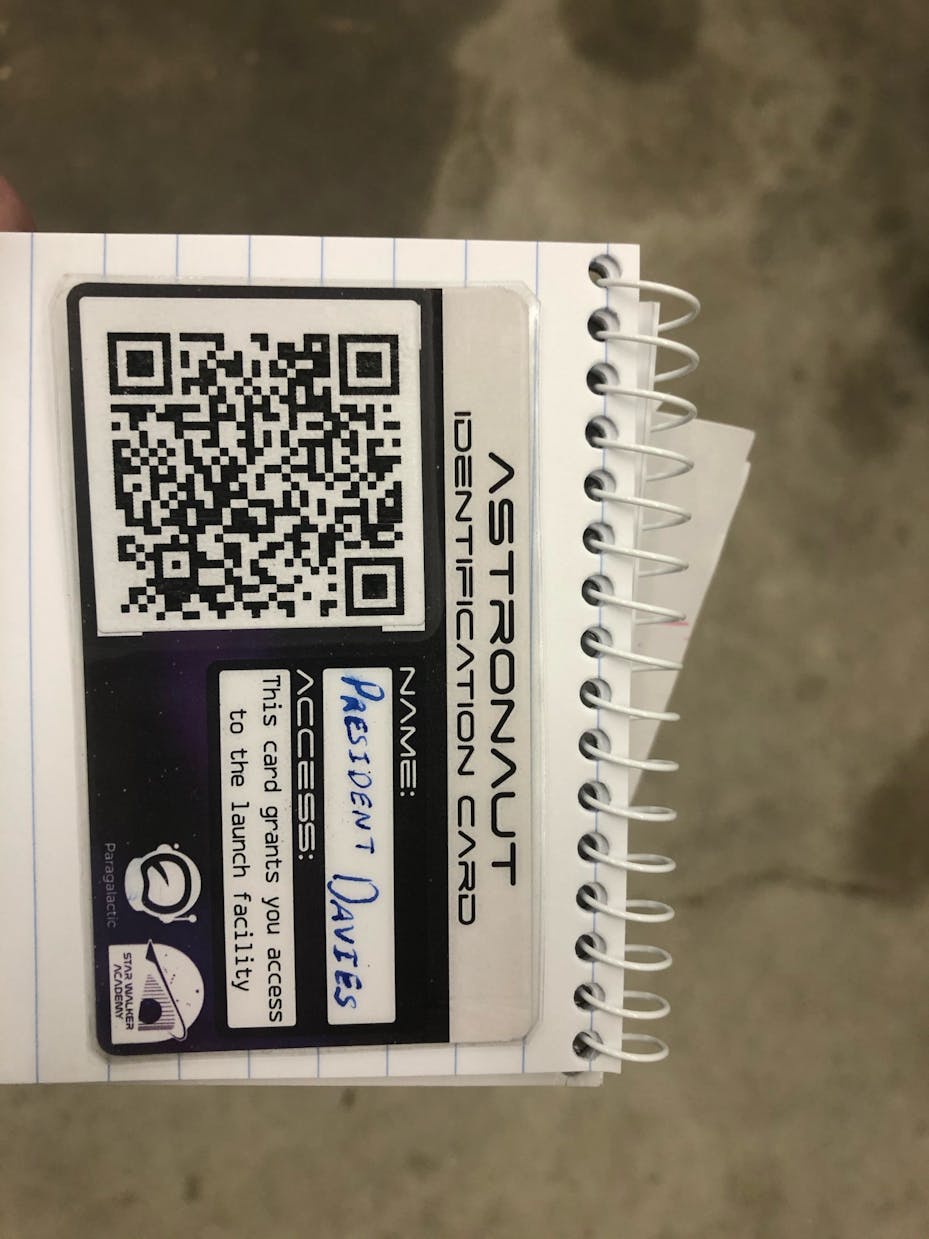Flight simulator lab creates unique opportunity for students

John Apo, left, closes the flight simulator as Collin Van Brabant, right, waits to pilot a simulated flight in the Michigan Aviation Center for Simulations, Central Michigan University, Oct. 29, 2020.
You climb inside a red sphere and are surrounded by complete darkness. A screen in front of you lights up with the image of an airport runway.
It is up to you to take off and pilot your way to a safe landing.
It took two semi trucks, custom built crates and many long weekends before the flight simulator lab at Central Michigan University could take off.
The Michigan Aviation Center for Simulations allows Central Michigan University students to work in the lab with Alex Redei, a computer science faculty member, to recreate and learn from aviation disasters.
When he started at CMU in the Fall 2019 semester, Redei opened a lab in the Technology and Engineering Building where he and his students began to build the flight simulators to give pilots a feeling of in-flight motion and turbulence.
"We are using our passions to create real-world solutions to flight disasters. That motivates me to work harder," Midland senior John Apo said.

Computer Science faculty member Alex Redei prepares the flight simulator for a flight in the Michigan Aviation Center for Simulations, Central Michigan University, Oct. 29, 2020.
In addition to aviation simulation, Redei and his team also created a space aeronautics game entitled "Paragalatic" in collaboration with the Fleischmann Planetarium in Reno, Nevada. As a three time University of Nevada, Reno graduate, Redei has ties to the Fleischmann Planetarium on its campus. The planetarium acts as an anchor for the "Paragalatic" project.
"Specifically, they know the science standards at each grade level and suggested we build something with an educational component for middle schoolers," Redei said.
The process for the game began in 2017 in Reno and came to CMU in 2019. The game officially launched in July this year, but is in ongoing development. Redei and his team are hoping to release a VR version of the game by next year.
Redei and his team describe the game as an "edu-tainment" space flight simulator. The educational part of "Paragalatic" conveys the difficulty of in space flight and shows chemical elements found in asteroids. The game is designed for middle school students and it is designed to meet state science standards for that grade level.
The game experience starts upon entering the Fleischmann Planetarium when players are given their 'Astronaut ID cards.' The ID cards give players a game profile for "Paragalatic." It also places players on a leaderboard for the game.
According to the game's website, the ID badges are compliant with social distancing guidelines. The barcode readers are touchless and are able to read QR codes from a distance.
COVID-19 has affected how the flight lab operates. The flight simulators are two seaters, but because of social distancing rules, the team can not perform any two person flight simulations. The team currently does one person flight simulations and use a headset to communicate with each other. Redei said that while it allows the team to communicate with the pilot it does not reflect the real experience.
Midland senior Rachel Crowley is a new addition to Redei's team. Crowley was introduced to the flight simulator in Fall 2019 when Redei talked about it at an Association of Information Technology Professionals-Association for Computing Machinery (AITP-ACM) club meeting.
"I thought it would be cool to work in a flight simulator lab, but at the time I was unable to because of a heavy class-load," Crowley said.
This semester, Crowley was able to join the lab. Dr. Redei is her independent studies advisor and he suggested Crowley use the lab as her independent study. Crowley said the team has been very welcoming and she looks forward to working with them more. This semester has mostly seen Crowley getting to know the team, visiting the lab and participating in meetings.
"I'm excited to dive in and start working next semester," Crowley said.
Crowley works primarily on the back end of "Paragalactic." This means she will be focused on revamping the website for "Paragalatic" and creating a mobile app. When the game is finished, the app will allow people to get in line for "Paragalactic" and check into the leaderboard system.
Collin Van Brabant first heard about the lab while enrolled in Dr. Redei's CPS 140 (Software Engineering) class in Fall 2019. The Chesterfield senior's experience working in the flight simulator lab has been a great one. He said he likes working with Dr. Redei because he is passionate about the lab.
"I'm really thankful for this opportunity," Van Brabant said. "It's been a lot of fun working on this project."

One of the 'Space ID Cards' created by Van Brabant. President Davies toured the lab as well, so the team made him an ID card for his visit. Michigan Aviation Center for Simulations, Central Michigan University, Oct. 29, 2020.
Van Brabant is a graphic and game designer for "Paragalactic." Since joining the flight simulator lab, he has designed the trailer, banner and ID badges for "Paragalatic." The ID badges designed by Van Brabant are connected to the game's website.
"I've always wanted to develop video game," Van Brabant said. "This lab has given me the chance to do that."
This the first semester John Apo, Midland senior, is working in the flight simulator lab. Apo has been working with Dr. Redei on projects since he started working at CMU in 2019. He also took Dr. Redei's CPS 410 class where he led a team of fellow students in a self defense virtual reality project called "KickAssVR." Apo continued the project in Redei's computer science capstone course.
"I must have shown some promise in my virtual reality development skills since he asked me to work on incorporating aspects of my KickAssVR project into his flight simulator," Apo said.
Apo works on, and is the main tester for, the VR capabilities for the flight simulator lab. He said working in the lab has blended his regular computer science course work with incredible hands on experience.
Redei is looking for more students, of any major, to join his flight lab team. He said anyone who is interested in this kind of work should email him at redei1a@cmich.edu.






